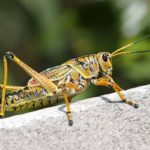
Mosquitoes can ruin the enjoyment of your yard, but with a few simple steps you can get rid of these pests and keep them away.
And if/when you’re tired of DIY mosquito control, you can always call in the professionals. With monthly treatments now offered through LawnStarter, you’ll be back enjoying your backyard patio and stop scratching mosquito bites.
First, let’s cover 10 ways you can do to deter mosquitoes from making your yard their home — and feasting on your arms and legs.
10 Ways to Get Rid of Mosquitoes (and Keep Them Away)
- 1. Eliminate Standing Water Sources
- 2. Maintain Your Lawn
- 3. Use Mosquito Foggers and Sprayers
- 4. Add Mosquito-Repelling Plants
- 5. Employ Natural Predators
- 6. Fans Mess with Mosquitoes’ Flight and Sense of Smell
- 7. Use Mosquito Dunks
- 8. Set Up Mosquito Traps
- 9. Get Mosquito Repellent Devices for the Yard
- 10. Hire a Mosquito Control Professional
1. Eliminate Standing Water Sources
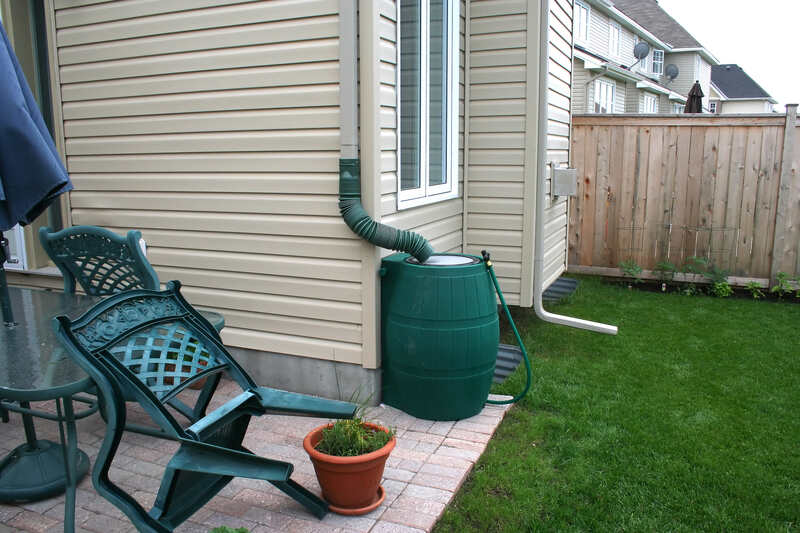
If you want to see fewer mosquitoes in your yard, remove any standing water. Why is this so important? Because still water is like a nursery for mosquitoes. Female mosquitoes love to lay their eggs in standing water that can be found in:
- Rain barrels
- Birdbaths
- Gutters
- Kiddie pools
- Pet bowls
- Saucers under flower pots
- Outdoor furniture crevices
Getting rid of these standing water sources is a proactive approach to mosquito control. By eliminating these water havens, you’re stopping the next generation from taking flight.
2. Maintain Your Lawn
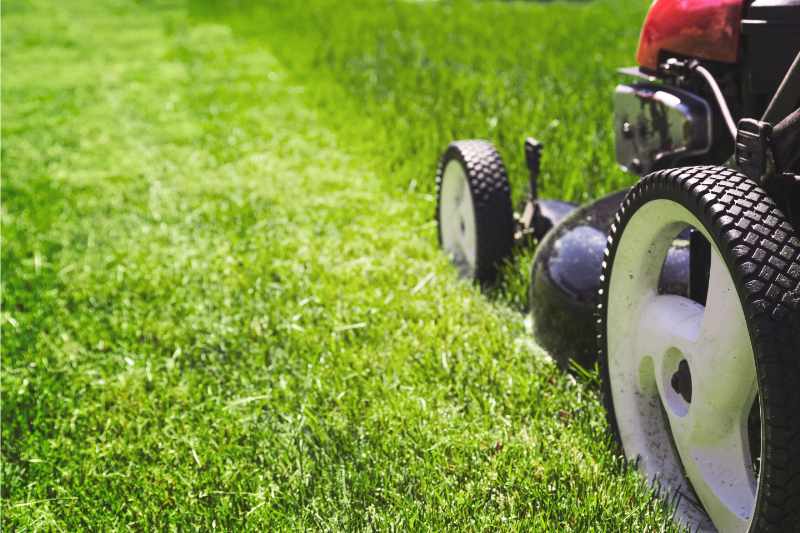
When it comes to making your yard less inviting for mosquitoes, basic lawn care plays a surprisingly pivotal role. Many homeowners are unaware that their lush green spaces can serve as a refuge for these pesky insects.
Here’s how mowing your lawn, trimming your shrubs, and dethatching and aerating can reduce your mosquito problem.
Mow Your Lawn: Mosquitoes love to lurk in tall grasses and dense vegetation. These places offer them protection from the scorching sun and predators, and they provide a cool and moist atmosphere, which is ideal for them.
Regularly mowing your lawn ensures that these insects don’t find such hiding spots.
Trim Shrubs: Overgrown shrubs, bushes, and hedges are attractive hideouts for mosquitoes. Keep these trimmed and in check so this vegetation doesn’t become a haven for mosquitoes.
Dethatch and Aerate: A lawn that doesn’t drain well can be a magnet for mosquitoes. Compacted soil prevents water from seeping in effectively, leading to pooling on the surface. Over time, this can become a prime breeding ground.
- Dethatching involves removing the layer of dead grass and roots on your lawn’s surface, promoting better water absorption.
- Aerating, which involves perforating the soil with small holes, allows water and air to penetrate more deeply.
These steps improve drainage, discourage water pooling, and subsequently reduce mosquito breeding spots.

3. Use Mosquito Foggers and Sprayers
Mosquito foggers and sprayers offer a more direct way to address the mosquito issue head-on, though they have distinct methods of operation and advantages. Which type of mosquito deterrent is right for you and your yard?
- Foggers release a fine mist of pesticide that permeates the air and settles onto surfaces, targeting both flying mosquitoes and those that might be resting in vegetation. Mosquito foggers typically have an immediate effect and require specialized machinery to be applied.
- Sprayers: Sprayers release a more direct stream of liquid insecticide. They allow you to target specific problem areas or breeding sites easily, just by attaching the hose-end to it. The effect of a mosquito sprayer will last longer in your yard.
Warning: Read and follow all label instructions when using insecticides. This includes ensuring the correct dilution rate and adhering to the specified waiting time before re-entering the treated area. Misusing these chemicals can pose health risks, so always prioritize safety.
4. Add Mosquito-Repelling Plants

What if your green space could double up as a mosquito repellent?
Here are some popular mosquito-repelling plants:
- Lemongrass
- Marigolds
- Peppermint
- Citronella grass
- Basil
- Catnip
5. Employ Natural Predators
Introducing or encouraging the presence of mosquito-eating species in your yard can be a strategic move. Here are some insects and other animals that have mosquitoes as part of their diet:
- Bats
- Birds like purple martins, bluebirds, and cardinals
- Damselflies and dragonflies
- Frogs
- Spiders
- Mosquitofish
- Aquatic beetles
Each of these predators, despite their appetite for mosquitoes, has a diverse diet, with mosquitoes often forming just a small fraction of their total intake. Moreover, the sheer number of these predators required to noticeably curb mosquito populations would be substantial. As such, don’t expect this strategy alone to solve your mosquito problems.
6. Fans Mess with Mosquitoes’ Flight and Sense of Smell
Fans can help ward off mosquitoes? Really? Yes, and here’s how:
Firstly, mosquitoes are weak fliers, so the wind currents generated by a fan make it challenging for them to navigate. This is especially useful in outdoor settings like patios, decks, or any area in your yard where you’re spending time.
Secondly, humans naturally exhale carbon dioxide (CO2), a primary attractant for mosquitoes. They have specialized sensors that help them locate potential blood meals by detecting CO2 plumes. A fan, especially when oscillating, disperses this carbon dioxide, making it harder for mosquitoes to zero in on their targets.
So, the next time you’re planning an outdoor gathering or a quiet evening in your yard, consider setting up a few fans around your relaxation zone.
7. Use Mosquito Dunks
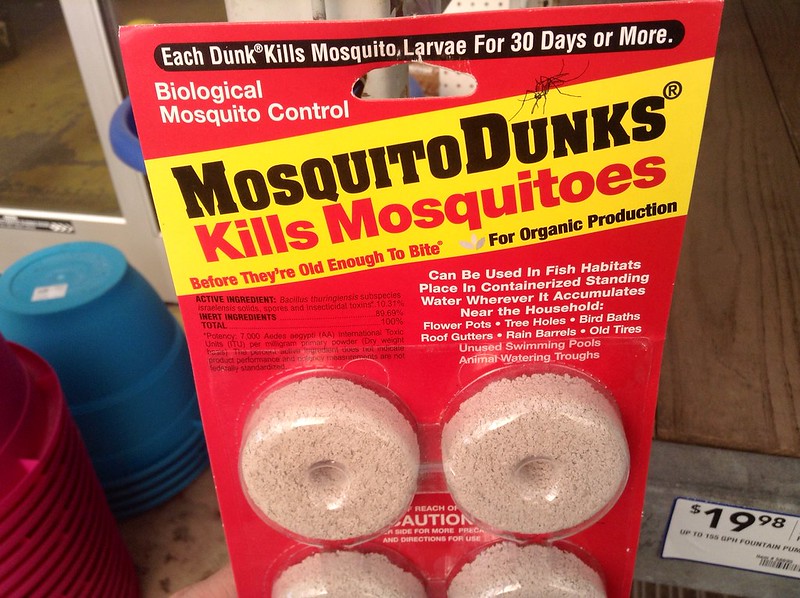
Photo Credit: Mike Mozart / Flickr / CC BY 2.0
Often, there are areas of standing water that we simply cannot eliminate. Enter larvicides, often referred to as mosquito dunks. These potent tools are designed specifically to target the immature stages of the mosquito life cycle.
At the heart of these larvicides is a bacteria known as Bacillus thuringiensis israelensis, or Bti. This bacteria targets and kills mosquito larvae, ensuring they don’t mature into the biting adults we’re familiar with. While lethal to mosquito larvae, Bti is harmless to other organisms, making it a safe and environmentally friendly option to control mosquitoes.
Utilizing larvicides is straightforward. They can be added to various stagnant water features around your property, including:
- Fountains
- Ornamental ponds
- Swimming pool covers
- Birdbaths
- Cisterns
- Rain barrels
- Septic tanks
Warning: Mosquito dunks should be reserved for water sources that aren’t intended for drinking.
8. Set Up Mosquito Traps
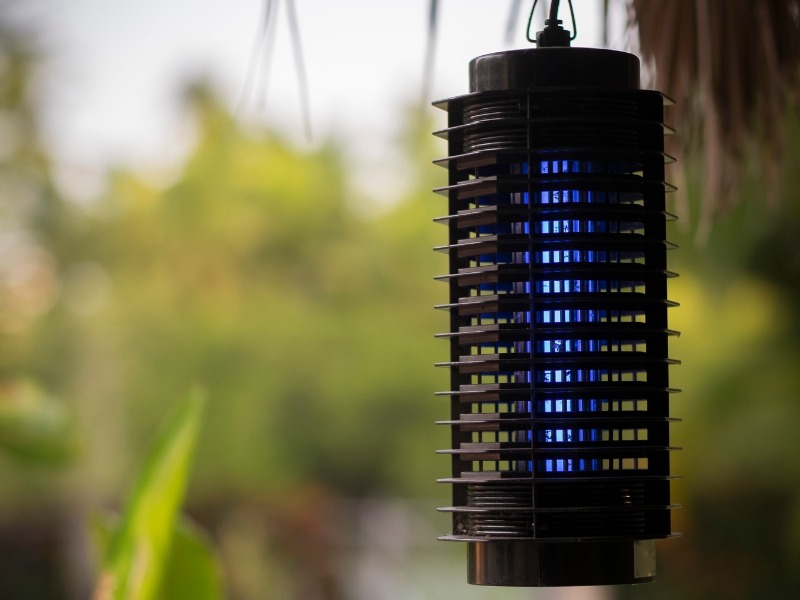
Mosquito traps have surged in popularity. Depending on your specific needs and preferences, there’s likely a mosquito trap that’s right for you:
- Bug zappers: These use UV light to attract mosquitoes and other insects. Once the insects approach, they are instantly killed by an electrified grid. They’re easy to use and often come in waterproof designs suitable for outdoor use.
- Sticky traps: Using adhesive sheets, these traps capture mosquitoes when they land. Some models incorporate UV light to increase their attractiveness to mosquitoes.
- Carbon dioxide traps: Mimicking the CO2 exhaled by humans by burning propane, these traps lure mosquitoes. Once near, a built-in fan or other mechanism traps the mosquitoes, preventing them from escaping.
- Portable vacuum fans: Compact and mobile, these traps combine UV light with a fan. Mosquitoes attracted to the light are then sucked in by the fan, trapping them inside.
While these traps can be incredibly effective at reducing mosquito populations, they do come with a downside: They often end up killing beneficial insects as well, including pollinators.
9. Get Mosquito Repellent Devices for the Yard
There are several mosquito repellent devices on the market, but if you’re working with a tighter budget, traditional mosquito-repelling coils, incense, and candles can offer a simpler and more affordable alternative.
10. Hire a Mosquito Control Professional
All these tips on how to get rid of mosquitoes may yet fail to turn your yard into a no-fly zone for these annoying biters. That’s when you should call a mosquito control pro, and LawnStarter lawn care customers now can get help solving this biting problem.
Call LawnStarter at 866‑822‑1766 or click to get monthly mosquito control that will keep the little buggers away so that you can enjoy your yard again.
Main Image Credit: Unsplash

![5 Best Tick Repellents for Your Yard [Reviews]](https://www.lawnstarter.com/blog/wp-content/uploads/2024/05/B-150x150.jpg)
